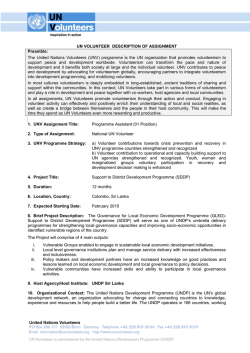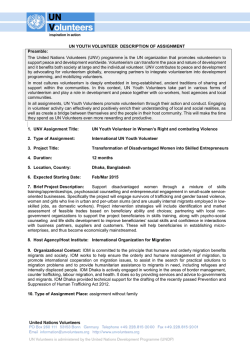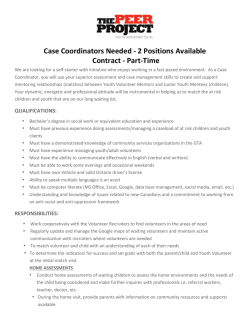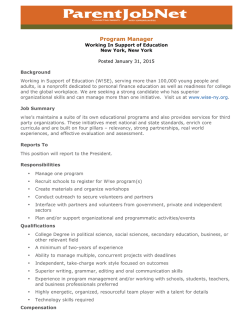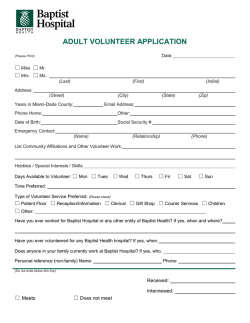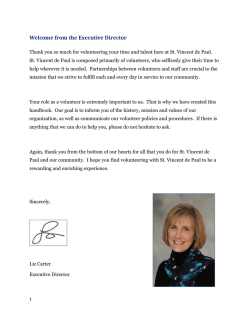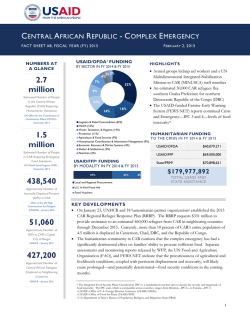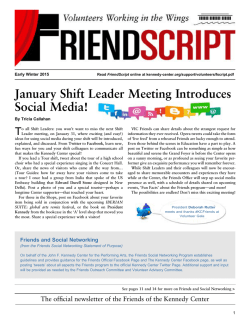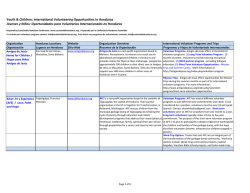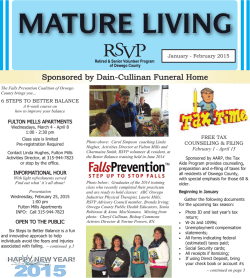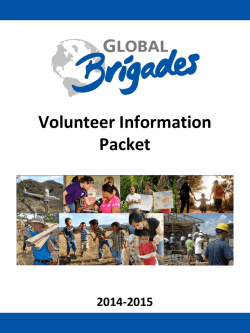
documento completo PDF - United Nations Volunteers
UN VOLUNTEER DESCRIPTION OF ASSIGNMENT Preamble: The United Nations Volunteers (UNV) programme is the UN organization that promotes volunteerism to support peace and development worldwide. Volunteerism can transform the pace and nature of development and it benefits both society at large and the individual volunteer. UNV contributes to peace and development by advocating for volunteerism globally, encouraging partners to integrate volunteerism into development programming, and mobilizing volunteers. In most cultures volunteerism is deeply embedded in long-established, ancient traditions of sharing and support within the communities. In this context, UN Volunteers take part in various forms of volunteerism and play a role in development and peace together with co-workers, host agencies and local communities. In all assignments, UN Volunteers promote volunteerism through their action and conduct. Engaging in volunteer activity can effectively and positively enrich their understanding of local and social realities, as well as create a bridge between themselves and the people in their host community. This will make the time they spend as UN Volunteers even more rewarding and productive. 1. UNV Assignment Title: UNV Human Rights Officer 2. Type of Assignment: International UN Volunteer 3. Project Title: Assistance to United Nations Multidimensional Integrated Stabilization Mission in the Central African Republic (MINUSCA) 4. Duration: 6 months initially (with possible extension depending on Mission’s mandate, operational necessity and satisfactory performance) 5. Location, Country: Various 6. Expected Starting Date: Immediate 7. Brief Project Description: The MINUSCA Human Rights Component supports the Transitional Authorities in implementing its obligations under international human rights and humanitarian law, and preventing and addressing violations. It provides support to the international Commission of inquiry and the implementation of its recommendations. The Component focuses on: monitoring, investigation and accountability for human rights and humanitarian law violations; protection of civilians (PoC); administration of justice, including transitional justice; and partnership with civil society and national institutions. The Human Rights Component conducts monitoring activities and investigations on violations of human rights and international humanitarian law, including in support of the implementation of the Monitoring and Reporting Mechanism (MRM) and Monitoring and Reporting Arrangements (MARA). It will also issue regular internal and public reports on the situation of human rights with a particular focus on protection of civilians. Human rights officers in MINUSCA visit and monitor detention facilities and provides advice, assistance and support to the Transitional authorities with capacity-building activities. 8. Host Agency/Host Institute: The United Nations Multidimensional Integrated Stabilization Mission in Central African Republic (MINUSCA) 9. Organizational Context: Concerned with the security, humanitarian, human rights and political crisis in the Central African Republic and its regional implications, the Security Council authorized on 10 April 2014 deployment of a multidimensional United Nations peacekeeping operation – MINUSCA, with the protection of civilians as its utmost priority. Its other initial tasks included support for the transition process; facilitating humanitarian assistance; promotion and protection of human rights; support for justice and the rule of law; and disarmament, demobilization, reintegration and repatriation processes. The newly established mission subsumed the UN Integrated Peace building Office in the Central African Republic (BINUCA) on the date of the establishment and has been set to take over authority in military and police matters from the African Union-led peacekeeping operation – MISCA – on 15 September 2014. (http://www.un.org/en/peacekeeping/missions/minusca/). 10. Type of Assignment: Non-family duty station 11. Description of tasks: Under the direct supervision of Chief Human Rights officer and his designated official in the Sector and/or Officer in Charge Human Rights Office and within delegated authority, the UN Volunteer Human Rights Officer will be responsible for the following duties: Researches and collects information pertaining to human rights matters, including their gender dimensions, from a variety of data sources; assists in the analysis of information, to include the impact on the human rights situation in CAR. Enter all cases on the human rights database according to human rights standards and its methodology. Maintains awareness of current human rights issues in the Region assigned to include relevant political and legal developments. Contributes to the identification of human rights issues/problems, including their gender dimensions, through good research and analysis and timely preparation of reports, etc. Liaises with government representatives, non-governmental organizations (NGOs), civil society organizations, UN agencies and other partners to create baseline data on the human rights situation in the Region assigned with special attention to vulnerable groups. Participates with other Human Rights Officers in discussions with relevant authorities and other influential actors with the aim of stopping or preventing human rights violations or seeks other remedial action by the authorities to prevent similar violations occurring in the future. Drafts a variety of types of reports relating to human rights matters. Participates in human rights training programmes for national law enforcement officials, representatives of the civil society and human rights non-governmental organizations (NGOs) in order to promote national capacity building. Reviews human rights issues, including their gender dimensions, and participates in discussions with other Human Rights Officers on the integration of these issues into political, humanitarian and economic efforts and programmes. Contributes to formulating courses of action that aim to alleviate immediate and long-range human rights problems. Demonstrates effective interaction with colleagues and other concerned parties internally and externally. When working with (including supervising) national staff or (non-) governmental counterparts, the incumbent is strongly encouraged to set aside dedicated time for capacity development through coaching, mentoring and formal and on-the-job training. Performs other related duties as required by direct supervisor Promotion of the UN Volunteer programme mandate UN Volunteers are expected to integrate the UNV programme mandate within their assignment as well as promote voluntary action through engagement with communities (urban & rural) during the course of their work. As such UN Volunteers should dedicate a proportion of their working week to the following in support of and in synergy with their primary role as UN Volunteer. Strengthen knowledge and understanding of the influence of voluntary action by the communities serviced directly or indirectly by MINUSCA by doing the following; Research of the subject matter; Develop knowledge of related non-profit community based organizations and promote major issues of these organizations through voluntary actions that will influence development and peace-building initiatives; Undertake awareness-raising (promotion) activities in communities that will increase knowledge of issues of interest to MINUSCA and UNV mandate; Encourage communities to volunteer thoughts and actions to the development of their communities on the basis of core child protection issues of concern. Build relationships with a wide range (private/public) of Community Based Organizations, (CBO’s) Civil Society Organizations (CSO’s) - to support and/or participate in community driven voluntary activities and assist them to tell their stories to the World Volunteer Web site; Encourage, mobilize and support co-workers and fellow UN Volunteers to better understand the connections between MINUSCA mandate and volunteerism; Monitor on a continual basis the impact of integrating issues, activities and voluntary action at the community level; Contribute to articles/write-ups on the peace-building and development process and experiences from the above outlined activities and submit them to UNV publications/websites, newsletters, press releases, etc.; Promote and/or advise CSO’s and Citizens groups in the use of OV (online volunteering), and encourage relevant - groups to use OV whenever – technically possible 12. Results/Expected Output: Monitoring and reporting on human rights violations in the duty assigned according to the United Nations methodology accomplished Producing daily, weekly and monthly regular reports to HQ done on time. Participating in advocacy meeting and follow up cases with local authorities in order to fight against impunity completed. Participating in activities aiming at strengthening the capacity of the local authorities in CAR met. Capacity building documented. A final statement of achievement towards volunteerism for development during your assignment, such as reporting on the number of volunteers mobilized, activities participated in. 13. Qualifications/Requirements: Education: An advanced university degree ( Master’s degree or equivalent) in law, political science, international relations, social sciences or related field. A first-level university degree in combination with two additional years of qualifying experience is also accepted in lieu of the advanced university degree. A minimum of three years of progressively responsible experience in human rights, political affairs, international relations, law or a related area. Experience in human rights monitoring and reporting is required. Experience in working in a United Nations common system field operation (inclusive of peacekeeping, political missions and UN agencies, funds, and programmes) – or similar international organization or non-governmental organization – in a conflict or post-conflict setting is an advantage. Experience working on thematic issues relevant to the MINUSCA mandate and/or work experience in Central Africa is desirable. Language skills: English and French are the working languages of the United Nations Secretariat. For this position, fluency in oral and written French is required. Solid knowledge of English is an advantage. Competencies: Professionalism: Knowledge of human rights issues and ability to identify related problems in their political, ethnic, racial, gender equality and socio-economic dimensions. Knowledge of institutional mandates of human rights organizations, prevailing policies and procedures. Research and analytical skills, including ability to identify and participate in the resolution of human rights issues. Ability to identify sources for data collection, analyze information and draft human rights reports. Shows pride in work and in achievements; demonstrates professional competence and mastery of subject matter; is conscientious and efficient in meeting commitments, observing deadlines and achieving results; is motivated by professional rather than personal concerns; shows persistence when faced with difficult problems or challenges; remains calm in stressful situations. Takes responsibility for incorporating gender perspectives and ensuring the equal participation of women and men in all areas of work. Communication: Speaks and writes clearly and effectively; listens to others, correctly interprets messages from others and responds appropriately; asks questions to clarify, and exhibits interest in having two-way communication; tailors language, tone, style and format to match audience; demonstrates openness in sharing information and keeping people informed. Teamwork: Works collaboratively with colleagues to achieve organizational goals; solicits input by genuinely valuing others’ ideas and expertise; is willing to learn from others; places team agenda before personal agenda; supports and acts in accordance with final group decision, even when such decisions may not entirely reflect own position; shares credit for team accomplishments and accepts joint responsibility for team shortcomings. 14. Living Conditions: Central African Republic is a non-family duty station with a difficult security and working environment. Living conditions are acceptable in Bangui, but security instructions need to be strictly complied with. The country is landlocked with very limited travel possibilities and surrounded by countries with volatile and security problems (Chad, DRC, Sudan, and Cameroon). Volatile socio-political situation and social unrest and grievance in particular in the capital city Bangui with frequent civil servants strikes causing interruption of health, education and civil service due to years of unpaid salaries. Power cuts are a norm causing insecurity in town. The population in Bangui including the expatriates is concerned about increasing cases of criminalities as a direct result of the March 2013 coup by the SELEKA – a coalition of rebel groups and recent events in December 2013 that carried the country into a chaos. The country is totally dependent on Cameroon sea port situated 1500 kms away causing regular shortage of basic domestic goods. Travel time from Douala (Cameroon) to Bangui for a truckload averages a week because of very bad roads and several roadblocks. The country security level is between 3 and 5 restricting movement to official travel only. Currently the curfew applies from 9 pm to 6am. This situation puts tremendous stress on staff and their family members. There are very limited medical infrastructures and services do not function properly. Nevertheless, a UN Dispensary provides basic medical care for the UN personnel and the UN hospital built is operational since August 2014. Only two airlines officially recognized by UN System serve the country: Air France (once a week), and Royal Air Maroc (twice a week). Flights are subject to cancellation when security situation volatility increases. MINUSCA operates two flights per week between Bangui and Entebbe, Uganda and it also operates a regular flight schedule between Bangui and other locations within CAR. Bria is located in eastern CAR, approximately 600 Km from Bangui (capital city). Security situation is stable there, no need for an escort. MINUSCA have identified two houses to be used as guests’ houses. The rehabilitation is in process and the houses will be ready around end of November 2014. For now offices are also used as accommodations. The local market is well furnished of basic goods and opened all the week. Bouar is located in western CAR, approximately 500 Km from Bangui where living conditions are quite acceptable. The local market is opened every day and well furnished with seasonal fruit and basic goods. The hospital is also functional. As everywhere in CAR it is difficult to find houses well accommodated but interesting possibilities still exist and living cost is better than in Bangui. The security situation is stable but an escort is needed for some distance. Kaga Bandoro, is located in the center is 320 Km far from Bangui and the same living conditions of Bouar applies here. Rest & Recuperation (R&R) scheme in Bangui has been re-established since August 2013 and maintained for all CAR duty stations to a 6 weeks frequency. Living conditions are becoming more and more difficult due to the high cost of living and the scarcity of basic products and food. Fresh vegetables and fruits are available in the market. There is no MINUSCA (The United Nations Multidimensional Integrated Stabilization Mission in Central African Republic (MINUSCA) Guest House in Bangui. Private accommodation possibilities are limited and getting a house according to the security measures can take about 4 weeks or more. Nevertheless, currently all serving UN Volunteers have a decent accommodation ensuring minimum and above the minimum standard of comfort. The average cost for accommodation varies from around 500 USD, for a small apartment with no furniture and no power generator, to 1700 USD with all commodities. For the sake of rewarding experience, UN Volunteers in CAR carry out their duties with flexibility, commitment, and a willingness to live and work in challenging conditions including heat and limited water and electricity supply. Security recommendations from the UN Department of Safety and Security (UNDSS) must be followed by all UN Staff in the course of their assignments in CAR. 15. Conditions of Service Initial contract from Entry on Duty (EOD) until 30 June 2015 with further possible extension based on Mission’s mandate, operational necessity and satisfactory performance. A volunteer receives a monthly Volunteer Living Allowance (VLA) intended to cover housing, basic needs and utilities, equivalent to US$ 2,315 for single person, US$ 2,565 for person with one recognized dependant, and US$ 2,765 for person with two or more recognized dependants. Settling-In-Grant (SIG) (if applicable); life, health, and permanent disability insurance; return airfares (if applicable); and a monthly Resettlement Allowance (RSA) of US$150.00 for satisfactory service are provided. The UNV programme will provide a copy of the UN Volunteers Conditions of Service to the successful UN Volunteer candidate together with the offer of assignment. 16. Application If you are not yet registered in the UNV database, please apply by completing the UNV web application at the following link: https://ereta.unv.org/html/index.php?module=myprofile. Important: Please select the following code from the drop down menu on the first page of the application: “15CAF_HUMRIGHT”. If you are registered in the UNV database, please update your profile at: http://MyProfile.unv.org, click on the “Special Recruitment” option on the left menu, then click on the “Edit” button and select the advertisement code “15CAF_HUMRIGHT”. Application deadline is 16 February 2015. Only short-listed candidates will be contacted. The United Nations Volunteers (UNV) programme is committed to ensuring gender equity among UN Volunteers and applications from qualified women are strongly encouraged.
© Copyright 2026
